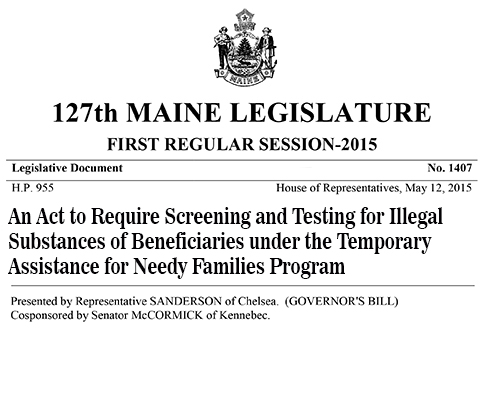States that have enacted laws requiring drug tests for welfare recipients have seen those laws proven ineffective or struck down in court, or both. Yet despite the evidence that suggests these laws simply don’t work, they keep appearing for consideration, in state after state, and now once again in Maine.
The popularity of these laws shows there is nothing to lose in kicking the poor while they are down, and something to gain in being seen as tough on drugs and hard on welfare cheats.
But while those points make for good sound bites, they are poor public policy. Put forth ostensibly to curb drug addiction and protect children in needy families, they do neither, and instead distract from the very real problems facing Maine.
The latest proposal, L.D. 1407, submitted by the LePage administration and the subject of a legislative public hearing on Monday, would deny welfare benefits to people with felony drug convictions. It also would submit welfare recipients to a substance abuse screening test, with those who score above a certain threshold required to take a drug test.
Those who test positive, or who refuse a test, then would have to enter a treatment program or lose benefits.
Denying benefits to drug felons would put the state in line with federal rules, but it might cause problems in a state where felony drug possession can mean as little as one pill. It is unclear whether the state, for the purposes of dispensing aid, would consider a 15-year-old conviction on a small amount any different from a recent conviction involving larger amounts of drugs.
But the real problems with L.D. 1407 start with the drug testing mandate. Aimed at saving public money and reducing drug use, these programs have done neither when implemented in other states.
Florida, for instance, tested all its welfare recipients for a few months, until the program was ruled unconstitutional. In that time, just 2.6 percent of recipients failed a test, mostly for marijuana. Even considering what was saved on recipients who failed the test, the program cost the state $45,780.
Similarly, in Utah and Missouri, both of which used the same screening process that’s proposed in Maine, less than 1 percent of recipients ultimately failed the drug test.
Other states have found the same thing — Oklahoma, Kansas, Arizona, Tennessee, all the states that have tried the assessment and testing strategy have discovered that drug abuse is not the problem among welfare recipients that they thought it was.
Of course, some will argue that if such a program helps one family overcome addiction, or ferrets out just a few people who are abusing the system, then it is worth it.
But as the LePage administration points out, Maine has limited resources to spend on public assistance, and those limited resources should be spent wisely.
If the goal is to curb drug addiction, then those dollars should be spent on the drug treatment initiatives that are so woefully underfunded. If the goal is to get more people off welfare, then the focus should be on the job training and “welfare cliff” proposals that have found bipartisan popularity but could certainly use more support.
Instead, the poor are stereotyped as drug abusers, and addiction is treated as a personal failing.
That stirs up emotions. It has won elections. But it doesn’t really solve any problems.
Send questions/comments to the editors.



Success. Please wait for the page to reload. If the page does not reload within 5 seconds, please refresh the page.
Enter your email and password to access comments.
Hi, to comment on stories you must . This profile is in addition to your subscription and website login.
Already have a commenting profile? .
Invalid username/password.
Please check your email to confirm and complete your registration.
Only subscribers are eligible to post comments. Please subscribe or login first for digital access. Here’s why.
Use the form below to reset your password. When you've submitted your account email, we will send an email with a reset code.